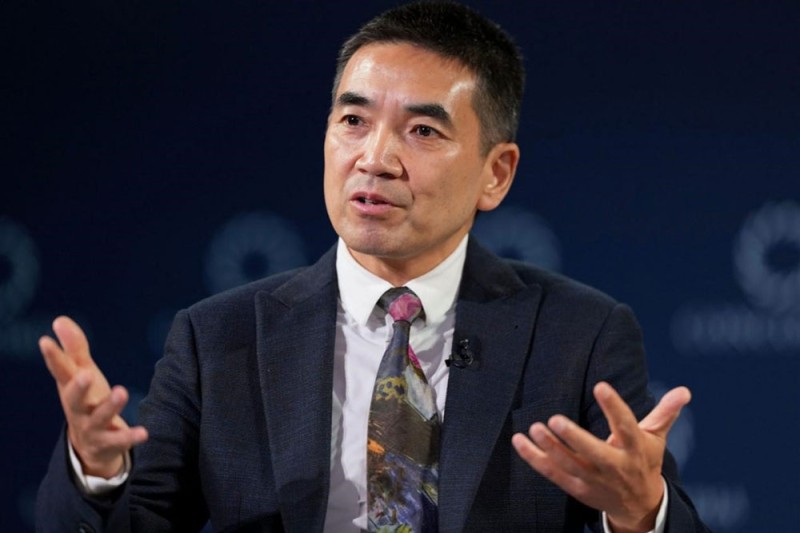
• Zoom首席执行官袁征预测,人工智能聊天机器人和智能代理将助力实现每周三至四天工作制,这一观点与比尔·盖茨(Bill Gates)、黄仁勋(Jensen Huang)及杰米·戴蒙(Jamie Dimon)等人的看法不谋而合。不过,这位科技界领军人物同时承认,在这一变革进程中,部分岗位可能会消失,届时有些人可能面临整周无班可上的局面。
商界领袖对于人工智能将如何重塑人类工作模式的看法存在分歧。有些人,如Anthropic首席执行官达里奥·阿莫迪(Dario Amodei),预言人工智能将引发“白领工作岗位末日”;而另一些人,如谷歌DeepMind负责人戴密斯·哈萨比斯(Demis Hassabis),则认为这项技术将开启物质丰裕的“黄金时代”。
然而随着越来越多聊天机器人和自动化助手接手人类工作任务,越来越多高管预见工作周将缩短——Zoom首席执行官袁征甚至认为员工每周仅需到岗工作数日。
“在我看来,既然人工智能能让我们的生活变得更美好,那为何还要每周工作五天呢?”袁征近期在接受《纽约时报》采访时表示:“每家公司都将支持每周三天或四天工作制。我认为这终将为每个人腾出更多时间。”
对深陷企业搏命文化的美国人而言,这番话无疑是“悦耳佳音”——他们看着欧洲同行试行每周四天工作制,并取得显著成效,艳羡不已。当美国体能训练公司Exos尝试将每周工作日减少一天,事实证明此举对业务发展助力颇大:员工倦怠率大幅降低至原来的一半,工作效率则飙升24%。首席执行官们一致认为,自动化带来的工作周缩短对人类工作者而言是重大利好——即便这意味着整体就业岗位减少。
《财富》杂志已联系Zoom寻求置评。
多位科技界领袖均预见未来工作周将缩短
人工智能工具为员工提供极大助力,从发送邮件这类枯燥乏味的任务到编程这类复杂繁琐的任务,皆可替代。科技领袖们正见证人工智能带来的效益提升,并认为“每周五天工作制”或将成为历史。
微软联合创始人盖茨早在20世纪70至80年代就率先引领科技革新浪潮;如今,这位亿万富翁预测,按照人工智能当前的创新速度,未来十年人类将不再需要从事“大多数工作”。当不再需要人类完成工作时,仍留在岗位的人也无需每日打卡上班。
“未来的工作究竟会呈现何种模样?我们是否只需每周工作两到三天?”盖茨今年2月在《今夜秀》节目中对主持人吉米·法伦(Jimmy Fallon)表示,“把目光放长远些,人生的意义不应仅限于工作。”
英伟达(Nvidia)首席执行官黄仁勋对缩短工作周的主张表示认同,不过他提出了一个前提条件。这家市值达4万亿美元的图形处理器巨头的掌舵人表示,我们正处于“人工智能革命的开端”,倘若各行业持续以当前速度普及人工智能,“很可能”实现每周四天工作制。不过黄仁勋预测,未来工作强度将“比现在更高”,这些工作可能被压缩在更为紧凑的时间表中。
即便是以“员工每周工作80小时”著称的金融业,也能借助人工智能自动化获得喘息之机。摩根大通(JPMorgan Chase)首席执行官戴蒙多年前就曾预言,人工智能技术 “必然”会取代部分岗位,但也有望改善人们的工作与生活平衡。
“在科技的助力下,你们的孩子将能活到100岁,还将远离癌症的侵扰。”2023年,戴蒙在接受彭博电视台采访时表示,“毫不夸张地说,他们未来或许每周只需工作三天半。”
Zoom首席执行官坦言部分岗位将被淘汰
尽管全球劳动者终将迎来每周工作天数减少的机会,但并非人人都能享受工作周缩短带来的利好。企业领导者普遍承认,就业市场将迎来巨大变革——在这一转变过程中,部分岗位将不可避免地被自动化所取代。Zoom首席执行官直面现实:部分人类员工将面临裁员,但他认为,这不过是又一次社会调整,如同工业革命和互联网诞生时的情形。
“每次技术范式转变都会导致部分岗位消失,但也会创造新机遇,”袁征在采访中坦言,“对于初级工程师这类岗位而言,我们能够借助人工智能来完成代码编写工作,但仍需要专业人员来管理这些代码。此外,我们还会创建大量数字代理,而这些代理同样需要专人管理。”
其他企业首席执行官,如福特(Ford)首席执行官吉姆·法利(Jim Farley)、Klarna首席执行官塞巴斯蒂安·西米亚特科夫斯基(Sebastian Siemiatkowski),也认同“变革将淘汰部分岗位”的观点。不过,也有部分领导者(如黄仁勋)认为,人工智能实际上可能会促进就业。这位芯片行业领军人物表示,人类不会被人工智能取代,相反,那些能够熟练运用先进技术的人将接管相关岗位。
“回溯过往300年、100年、60年,乃至计算机时代,生产效率得到提升,就业率也实现增长。”黄仁勋今年接受美国有线电视新闻网(CNN)采访时表示,“原因在于,如果我们拥有足够多的创意,以及构建更美好未来的具体路径,那么当生产效率提高时,我们就能将这些美好愿景变为现实。”(*)
译者:中慧言-王芳
• Zoom首席执行官袁征预测,人工智能聊天机器人和智能代理将助力实现每周三至四天工作制,这一观点与比尔·盖茨(Bill Gates)、黄仁勋(Jensen Huang)及杰米·戴蒙(Jamie Dimon)等人的看法不谋而合。不过,这位科技界领军人物同时承认,在这一变革进程中,部分岗位可能会消失,届时有些人可能面临整周无班可上的局面。
商界领袖对于人工智能将如何重塑人类工作模式的看法存在分歧。有些人,如Anthropic首席执行官达里奥·阿莫迪(Dario Amodei),预言人工智能将引发“白领工作岗位末日”;而另一些人,如谷歌DeepMind负责人戴密斯·哈萨比斯(Demis Hassabis),则认为这项技术将开启物质丰裕的“黄金时代”。
然而随着越来越多聊天机器人和自动化助手接手人类工作任务,越来越多高管预见工作周将缩短——Zoom首席执行官袁征甚至认为员工每周仅需到岗工作数日。
“在我看来,既然人工智能能让我们的生活变得更美好,那为何还要每周工作五天呢?”袁征近期在接受《纽约时报》采访时表示:“每家公司都将支持每周三天或四天工作制。我认为这终将为每个人腾出更多时间。”
对深陷企业搏命文化的美国人而言,这番话无疑是“悦耳佳音”——他们看着欧洲同行试行每周四天工作制,并取得显著成效,艳羡不已。当美国体能训练公司Exos尝试将每周工作日减少一天,事实证明此举对业务发展助力颇大:员工倦怠率大幅降低至原来的一半,工作效率则飙升24%。首席执行官们一致认为,自动化带来的工作周缩短对人类工作者而言是重大利好——即便这意味着整体就业岗位减少。
《财富》杂志已联系Zoom寻求置评。
多位科技界领袖均预见未来工作周将缩短
人工智能工具为员工提供极大助力,从发送邮件这类枯燥乏味的任务到编程这类复杂繁琐的任务,皆可替代。科技领袖们正见证人工智能带来的效益提升,并认为“每周五天工作制”或将成为历史。
微软联合创始人盖茨早在20世纪70至80年代就率先引领科技革新浪潮;如今,这位亿万富翁预测,按照人工智能当前的创新速度,未来十年人类将不再需要从事“大多数工作”。当不再需要人类完成工作时,仍留在岗位的人也无需每日打卡上班。
“未来的工作究竟会呈现何种模样?我们是否只需每周工作两到三天?”盖茨今年2月在《今夜秀》节目中对主持人吉米·法伦(Jimmy Fallon)表示,“把目光放长远些,人生的意义不应仅限于工作。”
英伟达(Nvidia)首席执行官黄仁勋对缩短工作周的主张表示认同,不过他提出了一个前提条件。这家市值达4万亿美元的图形处理器巨头的掌舵人表示,我们正处于“人工智能革命的开端”,倘若各行业持续以当前速度普及人工智能,“很可能”实现每周四天工作制。不过黄仁勋预测,未来工作强度将“比现在更高”,这些工作可能被压缩在更为紧凑的时间表中。
即便是以“员工每周工作80小时”著称的金融业,也能借助人工智能自动化获得喘息之机。摩根大通(JPMorgan Chase)首席执行官戴蒙多年前就曾预言,人工智能技术 “必然”会取代部分岗位,但也有望改善人们的工作与生活平衡。
“在科技的助力下,你们的孩子将能活到100岁,还将远离癌症的侵扰。”2023年,戴蒙在接受彭博电视台采访时表示,“毫不夸张地说,他们未来或许每周只需工作三天半。”
Zoom首席执行官坦言部分岗位将被淘汰
尽管全球劳动者终将迎来每周工作天数减少的机会,但并非人人都能享受工作周缩短带来的利好。企业领导者普遍承认,就业市场将迎来巨大变革——在这一转变过程中,部分岗位将不可避免地被自动化所取代。Zoom首席执行官直面现实:部分人类员工将面临裁员,但他认为,这不过是又一次社会调整,如同工业革命和互联网诞生时的情形。
“每次技术范式转变都会导致部分岗位消失,但也会创造新机遇,”袁征在采访中坦言,“对于初级工程师这类岗位而言,我们能够借助人工智能来完成代码编写工作,但仍需要专业人员来管理这些代码。此外,我们还会创建大量数字代理,而这些代理同样需要专人管理。”
其他企业首席执行官,如福特(Ford)首席执行官吉姆·法利(Jim Farley)、Klarna首席执行官塞巴斯蒂安·西米亚特科夫斯基(Sebastian Siemiatkowski),也认同“变革将淘汰部分岗位”的观点。不过,也有部分领导者(如黄仁勋)认为,人工智能实际上可能会促进就业。这位芯片行业领军人物表示,人类不会被人工智能取代,相反,那些能够熟练运用先进技术的人将接管相关岗位。
“回溯过往300年、100年、60年,乃至计算机时代,生产效率得到提升,就业率也实现增长。”黄仁勋今年接受美国有线电视新闻网(CNN)采访时表示,“原因在于,如果我们拥有足够多的创意,以及构建更美好未来的具体路径,那么当生产效率提高时,我们就能将这些美好愿景变为现实。”(*)
译者:中慧言-王芳
• Zoom CEO Eric Yuan predicted that AI chatbots and agents will bring about a three or four-day workweek, echoing the likes of Bill Gates, Jensen Huang, and Jamie Dimon. But some people may find themselves free all week, as the tech leader admitted that some jobs will be erased in the process.
Business leaders are split on how AI will transform the way people work. Some, like Anthropic CEO Dario Amodei, predict a white-collar jobs armageddon, while others like Google DeepMind leader Demis Hassabis believe the tech will usher in a “golden era” of abundance.
However, as more chatbots and automated assistants take over the duties of human roles, there’s a growing cohort of executives who see shorter workweeks on the horizon—and Zoom CEO Eric Yuan can even see staffers only clocking in a few days a week.
“I feel like if A.I. can make all of our lives better, why do we need to work for five days a week?” Yuan told The New York Times in a recent interview. “Every company will support three days, four days a week. I think this ultimately frees up everyone’s time.”
It’s music to the ears of Americans stuck in corporate hustle culture, enviously watching their European peers trial four-day workweeks with major success. And when U.S. performance coaching company Exos experimented with schedules one workday shorter, it proved to be good for business; employee burnout was cut in half, and productivity soared by 24%. And CEOs agree shorter workweeks born from these automation gains will be terrific for human workers—even if it means fewer of them have jobs in general.
Fortune reached out to Zoom for comment.
Other CEOs including Gates, Huang, and Dimon see a shorter workweek ahead
AI tools can be immensely useful for staffers, cutting out everything from menial tasks like emailing to more tedious jobs like coding. Tech leaders are seeing the gains from AI firsthand, and they’re promoting the possibility that employees will no longer have to clock in five days a week.
Microsoft cofounder Gates first pioneered technology back in the 1970s and 1980s; and now, the billionaire predicted that AI’s current pace of innovation will remove the need for humans for “most things” in the next 10 years. When people are no longer needed, those who are left on staff won’t have to swipe in daily.
“What will jobs be like? Should we just work like 2 or 3 days a week?” Gates told Jimmy Fallon on The Tonight Show in February. “If you zoom out, the purpose of life is not just to do jobs.”
Nvidia CEO Huang is also on board with the idea of fewer workdays—but has a catch. The leader of the $4 trillion GPU company said that we’re just “at the beginning of the AI revolution,” and if industries continue to adopt artificial intelligence at the current rapid rate, it could “probably” bring about a four-day workweek. However, that work may only be crammed into a condensed schedule, as Huang predicts that we’re going to be “busier in the future than now.”
Even the financial industry—known for putting its workers through 80-hour workweeks—may finally get some relief from AI automation. JPMorgan Chase CEO Dimon predicted years ago that the technology may bring about better work-life balance, although it would “of course” replace some jobs.
“Your children are going to live to 100 and not have cancer because of technology,” Dimon said in an interview with Bloomberg TV back in 2023. “And literally they’ll probably be working 3 and a half days a week.”
Zoom CEO admits that some jobs will be erased
While workers globally will finally have the opportunity to clock in fewer days per week, not everyone will be enjoying the shortened schedules. Leaders are open to the fact that there will be a massive upheaval in the jobs market, with some roles inevitably automated in the shift. Zoom’s CEO doesn’t shy away from the reality that some humans will be fired—but it’s just another adjustment, just like the industrial revolution and birth of the internet.
“Whenever there’s a technology paradigm shift, some job opportunities are gone, but it will create some new opportunities,” Yuan admitted in the interview. “For some jobs, like entry-level engineers, we can use A.I. to write code. However, you still need to manage that code. You also create a lot of digital agents, and you need someone to manage those agents.”
Other chief executives like Ford CEO Jim Farley and Klarna leader Sebastian Siemiatkowski agree that some roles will be erased in the change—but some, like Huang, think it could actually bolster employment. Instead of humans being replaced by AI, the chip leader claimed that people’s roles will be taken over by others who can actually use the advanced tech.
“Over the course of the last 300 years, 100 years, 60 years, even, in the era of computers, not only did productivity go up, employment also went up,” Huang told CNN this year. “Now the reason for that is if we have an abundance of ideas, ways that we could build a better future, if we were more productive, we could realize that better.”

